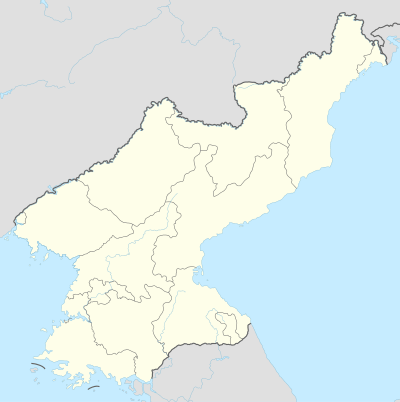Battle of Pyongyang (1950)
| Battle of Pyongyang (1950) | |||||||
|---|---|---|---|---|---|---|---|
| Part of Korean War | |||||||
| |||||||
| Belligerents | |||||||
|
| |||||||
| Commanders and leaders | |||||||
|
| Unknown | ||||||
| Units involved | |||||||
|
| Unknown | ||||||
 Location within North Korea | |||||||
The Battle of Pyongyang (17–19 October 1950) was one of the major battles of the United Nations' offensive during the Korean War. Following the Battle of Inchon, the UN forces re-captured Seoul, the capital of South Korea, and proceeded to advance north of the 38th parallel. Shortly after advancing, the American and South Korean forces faced the North Korean defenses near Pyongyang, the capital of North Korea, on 17 October.
North Korea's leadership and its main forces had already withdrawn to Kanggye,[3] allowing the allied forces to capture Pyongyang on 19 October.[4] The battle was followed by an airborne assault by the U.S. 187th Infantry Regiment 25 miles (40 km) north of Pyongyang, with the intention of cutting off North Korean units retreating from the city.[5]
After the Chinese Intervention the city came back into North Korean control by 5 December.[6]
See also
References
- ↑ Ohl, John Kennedy (1995). "Gay, Hobart R.". In Stanley Sandler. The Korean War: An Encyclopedia. New York and London: Garland Publishing. pp. 119–120. ISBN 0-8240-4445-2.
- ↑ Kortegaard, Bert. "5th Cavalry enters Pyongyang". www.koreanwaronline.com. Retrieved 16 August 2017.
- ↑ Mossman, Billy (June 29, 2005). United States Army in the Korean War: Ebb and Flow November 1950 – July 1951. University Press of the Pacific. p. 51.
- ↑ Stokesbury, James L (1990). A Short History of the Korean War. New York: Harper Perennial. p. 90. ISBN 0-688-09513-5.
- ↑ "Out in the Cold: Australia's involvement in the Korean War | The Australian War Memorial". www.awm.gov.au. Retrieved 16 August 2017.
- ↑ "BBC ON THIS DAY 1950: Pyongyang taken as UN retreats". news.bbc.co.uk. BBC. Retrieved 27 July 2017.